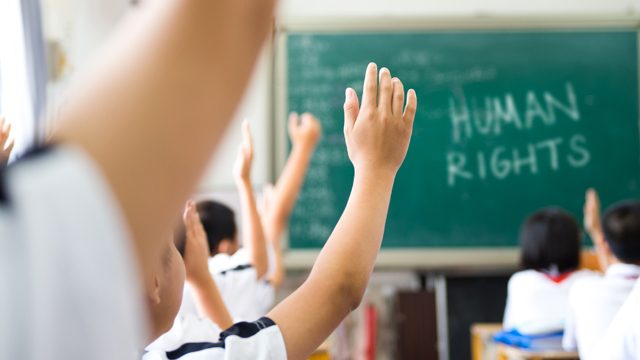SUMMARY
This is AI generated summarization, which may have errors. For context, always refer to the full article.

MANILA, Philippines (UPDATED) – Senator Leila de Lima on Tuesday, July 11, filed a bill urging the creation of a “separate and specialized” school subject on a hot issue in the Philippines today: human rights.
Senate Bill No. 1497 seeks to strengthen human rights education (HRE) among students in the elementary, high school, and college levels about basic human rights principles.
If passed, it will require the Department of Education (DepEd) and the Commission on Higher Education (CHED) to come up with their respective curricula and a course program for human rights studies.
The curriculum is expected to focus on “personal values, attitudes and behaviors that promote personal responsibility for respecting, upholding and protecting human rights, among others.”
De Lima, who was Commission on Human Rights (CHR) chairperson from 2008 to 2010, said the bill becomes more relevant now given the situation brought about by President Rodrigo Duterte’s war on drugs.
“In a time when human rights are violated on a daily basis, it is but the State’s responsibility to protect every citizen against human rights abuse both by state and non-state actors,” she said.
Human rights education in its infancy in PH
A 2012 study by Maricel Fernandez and Alex Brillantes Jr, commissioned by the CHR and the United Nations Development Programme (UNDP), found that human rights education in the Philippines is “still in its infancy.”
It added that teaching human rights in the Philippines has been stuck in the “appreciation level” only.
This may be one reason why there seems to be a misconception about the mandate of the CHR and the coverage of human rights based on comments on various Rappler stories that feature the national institution. (READ: Hate human rights? They protect freedoms you enjoy)
The study recommended that specific courses and sufficient number of hours dedicated to human rights be made mandatory in the primary levels. College students, meanwhile, should have the option to even specialize on the subject.
“It is important to have human rights education that should start from the primary educational years of a human being,” it said.
In November 2016, Education Secretary Leonor Briones said that the CHR was reviewing competencies of human rights education in the K to 12 curriculum.
CHR Commissioner Karen Gomez-Dumpit, in an interview with Rappler in May 2017, said that they were “in the process of review and assessment” of the educational modules on human rights.
Despite these efforts, according to De Lima, human rights education is still “merely incorporated” in existing subjects under the K to 12 curriculum.
She added that the country should push for a stronger implementation of human rights education in adherence to the international treaties and recommendations of international bodies.
CHR Chairperson Chito Gascon on Thursday, July 13, said the existing human rights education plans have not been fully utilized in all classroom settings.
“One concern encountered is that it is not mainstreamed enough that enough teachers use them,” Gascon told Rappler. “We do not object to Senator Leila’s proposal and will work with DepEd on whatever is possible.”
Into the grassroots
The concept of human rights, according to advocates, was successfully “demonized” and painted as an obstacle to the kind of change that Duterte wanted to achieve. (READ: ‘Demonizing’ human rights in the first year of Duterte)
To improve the understanding of the concept, aside from emphasizing its importance through school subjects, human rights groups now want to bring human rights education to the poorest sectors of society.
“We realized that in the past 30 years, the human rights education and conscientization work that we have undertaken and invested in, did not really trickle down to the grassroots,” In Defense of Human Rights and Dignity Movement (iDEFEND) spokesperson Ellecer Carlos told Rappler in an interview for Duterte’s first year.
CHR, meanwhile, is focusing on turning human rights concepts into “digestible” forms. (READ: Human rights in Duterte’s 1st year: Where do we go from here?)
“I think… we didn’t probably do a good job in translating human rights from hifalutin technical concepts into concepts that are felt in everyday lives,” Gomez-Dumpit explained. – Rappler.com
Add a comment
How does this make you feel?
There are no comments yet. Add your comment to start the conversation.